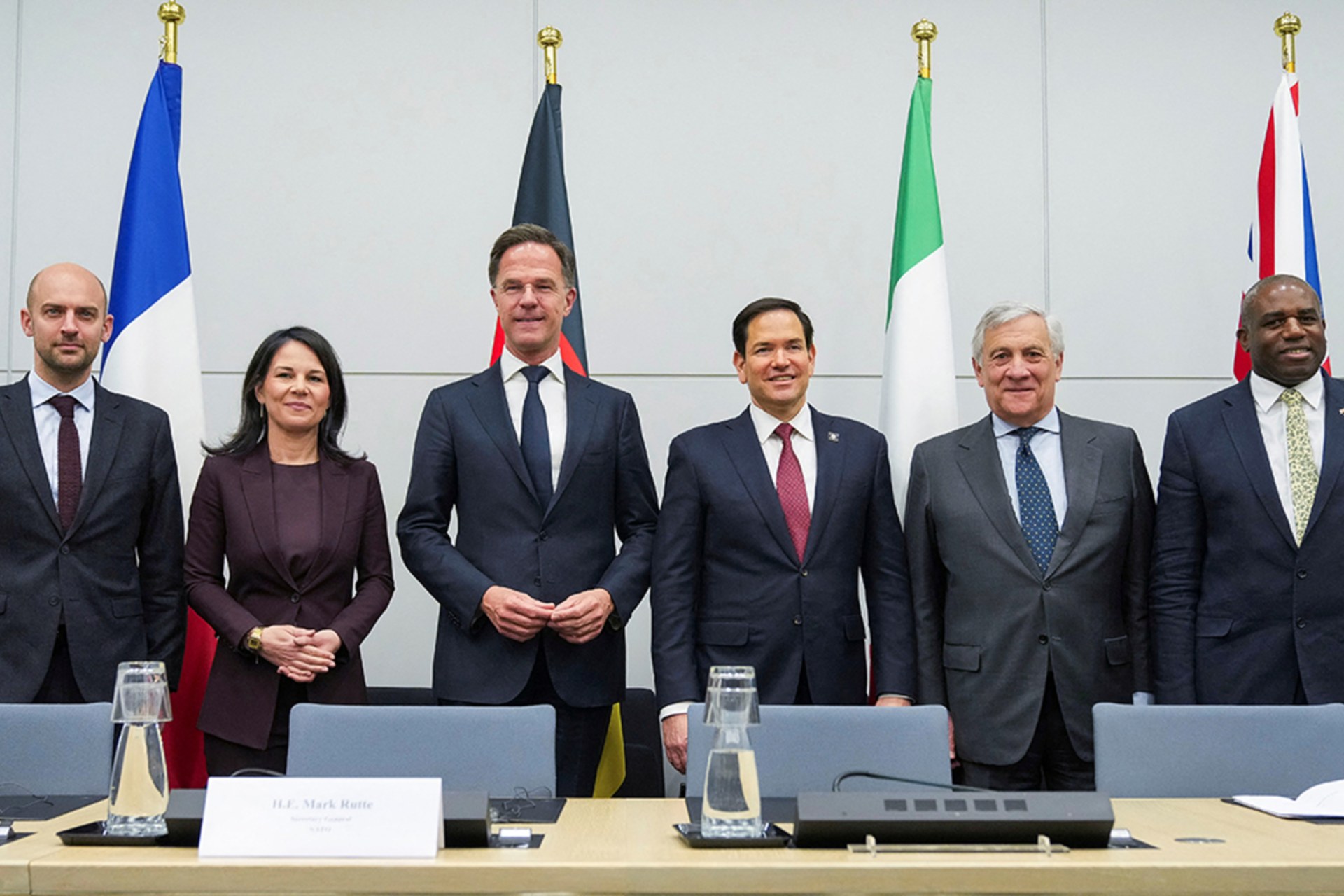NATO Meets in Brussels

By experts and staff
- Published
By
- CFR Editors
Welcome to the Daily News Brief, CFR’s flagship morning newsletter summarizing the top global news and analysis of the day.
Subscribe to the Daily News Brief to receive it every weekday morning.
Top of the Agenda
NATO members are weighing strategies for European security in Brussels amid mounting trade war concerns. The alliance wraps up a two-day foreign ministers meeting today. It had been strained over the United States’ new distance from Ukraine even before U.S. President Donald Trump announced steep tariffs on longtime trade partners this week. The Trump administration has urged a quick end to the war in Ukraine, even briefly cutting off aid to Kyiv, while telling Europe to shore up its own defenses.
Defense priorities. The current meeting was set to cover topics such as security in Ukraine, the Middle East, and the Indo-Pacific.
- NATO Secretary General Mark Rutte said the ball is in Russia’s court regarding a truce. Several European officials called for setting a deadline for Moscow to respond to a truce proposal; Rutte did not comment regarding a potential date.
- A group of mostly European countries, which has met outside of NATO forums in recent weeks to plan support for Ukraine after a peace settlement, has been studying the potential use of NATO’s command-and-control structure, unnamed officials told the Financial Times.
Tariff worries. Some of Trump’s heaviest new levies are on NATO allies such as European Union (EU) countries, prompting condemnations.
- EU countries are split on how to respond, with Italy warning against escalation and France and Germany arguing for it.
- Canada announced 25 percent tariffs on cars traded outside the U.S.-Mexico-Canada Agreement in response to Trump’s auto tariffs.
- When asked to comment on U.S. tariffs, Rutte responded that they do not violate NATO treaties. EU foreign policy chief Kaja Kallas said ahead of a NATO-EU meeting that the tariffs are “not [a] very positive development” and that “we need to also develop our economies to be able to fund defense spending.”
“Even if the tariffs come down, there’s now a lack of trust with the United States, and it’s hard to demonstrate U.S. leadership when our closest allies don’t trust us.”
—CFR President Michael Froman tells Yahoo Finance
Across the Globe
China’s reciprocal tariff. Outside of NATO, China is also reacting to Trump’s new tariffs. Its commerce ministry said a 34 percent duty—the same level Trump announced for China on Wednesday—will be applied to all U.S. imports beginning April 10. Beijing also announced bans on exporting seven types of rare earths and added some U.S. tech firms to an “unreliable entity” list.
South Korean president removed. The country’s Constitutional Court unanimously voted to remove impeached President Yoon Suk Yeol from office today. The verdict triggers a snap presidential election within sixty days. For weeks, the court had been reviewing lawmakers’ decision to impeach Yoon after his short-lived declaration of martial law in December. The ruling said Yoon “severely violated the law;” he told South Koreans in a statement that he was “regretful and sorry that I could not live up to your expectations.”
NSA director fired. National Security Agency (NSA) and U.S. Cyber Command chief General Timothy Haugh has been dismissed, two senior congresspeople on intelligence committees and multiple other unnamed officials said. The White House, NSA, and Pentagon did not immediately comment for report in the Wall Street Journal. Numerous National Security Council aides were also reportedly fired yesterday.
OPEC+ speeds up production hike. The Russia- and Saudi Arabia-led alliance of oil-producing countries will increase its daily production more than previously planned in May, it announced yesterday—though plans could change depending on “evolving market conditions.” Global oil prices dropped after the announcement. Many OPEC+ members benefit from higher oil prices to balance their public finances, while Trump has called for them to put downward pressure on oil prices.
Asian maritime transport pact. Seven South Asian and Southeast Asian countries agreed at a meeting in Bangkok to create a sea transport corridor to boost regional connectivity and trade. Details of the deal were not immediately made public, though a spokesperson for Thailand’s foreign ministry said that it had gained “more urgency” after Trump’s tariff announcement. Signatories included Bangladesh, Bhutan, India, Myanmar, Nepal, Thailand, and Sri Lanka. At the same summit, India and Thailand signed a defense and infrastructure partnership agreement.
Canada, Mexico auto factory pause. Carmaker Stellantis is pausing work and laying off personnel at some Canadian and Mexican plants due to U.S. tariffs, the firm said yesterday. As a result, hundreds of workers in the United States who supply the plants will also be temporarily laid off. While Stellantis called the steps “necessary,” the United Auto Workers union criticized the decision.
Haiti protests. The leader of the country’s transition government pledged a new special budget for anti-gang measures and for the deployment of additional state security officers yesterday, after thousands of people demonstrated Wednesday against gang violence. It was the biggest protest since the interim government was sworn in a year ago.
Russia to arm West African juntas. Moscow will provide weapons and trainingto a new joint security force of the military governments of Burkina Faso, Mali, and Niger, Russian foreign minister Sergey Lavrov said. Paramilitary fighters from the Kremlin-linked Wagner Group have been active in all three countries in recent years.
The Weekend Ahead
Vietnam’s deputy prime minister begins a visit to the United States.
TikTok’s Chinese owner approaches a deadline to sell its U.S. operations or face a ban.
- The Inter-Parliamentary Union meets in Uzbekistan.
- Rwanda concludes hosting Africa’s first global artificial intelligence summit.